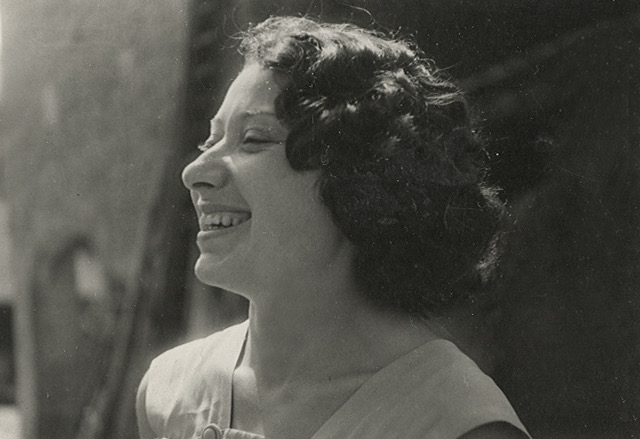Lidia Rolfi
April 18, 1925 - January 17, 1996, Mondovi Teacher, Author
Ravensbrück: June 27, 1944 - April 26, 1945

Lidia Rolfi (1949)
Lidia Rolfi was born on April 8, 1925 in a farming family as the last of five siblings. After finishing her teacher training, she started teaching immediately. At the beginning in a primary school in Torrette, a district of the municipality of Casteldelfino in Val Varaita (Cuneo region in Piedmont) and then in San Maurizio di Frassino in the same region.
Here soon she came in contact with the first partisan formations (11th Division Garibaldi, 15th Brigade "Saluzzo") and became a partisan in December 1943 with the battle name "Rossana".
On April 13, 1944, she was arrested by the GNR militia officers and taken to the infamous “Hotel zum Engel” in Sampeyre. Here she was interrogated and tortured for a whole night. The following day she was handed over to the Gestapo in Cuneo, which she locked up first in Saluzzo and then in the "Nuove" in Turin.
In Turin prison she was in a cell with Anna Segre Levi, the grandmother of her comrade-in-arms, Isacco Levi.
On June 27, she was deported to the Ravensbrück concentration camp along with another 13 comrades. These 14 women were the first Italian prisoners to be transported to Germany without any racial background.
She remained in the concentration camp until April 26, 1945, where she was assigned to forced labor in the neighboring Siemens factory.
She was liberated by the Red Army on an evacuation march ordered by the SS in the first days of May 1945.
The Allies sent her to a collective camp in Lübeck, where she stayed for 4 months and was waiting for repatriation.
At the beginning of September 1945 she was finally back in Italy. She started teaching again and worked simultaneously with the Institute of the History of Resistance in Cuneo and the Association of Former Deportees. In the years that followed, she worked to publicize the experiences of survivors of the concentration camps, especially women, by sharing her experiences in schools and many public meeting places.
She became a member of the International Ravensbrück Committee for Italy.
In 1978 the book "Die Frauen von Ravensbrück" was published by the publishing house Enaudi, which she had written together with Annamaria Bruzzone. It was the first book in Italian about the deportation of women to concentration camps in fascist Germany.
In 1996 her 2nd book, "The Thin Thread of Memory" (published by Enaudi) (German: "Return as a stranger - From Ravensbrück to Italy 1945 - 1948") was published, an autobiographical narrative about her return to the experiences in the camp and the difficult reintegration into normal life.
In 1997, posthumously - edited by Bruno Meida on the base of extensive notes by his son Aldo - the book "The Broken Future - Nazis Against Children" (publisher Giuntina) was published, an essay on a childhood spent under the Nazi dictatorship. Lidia Beccaria Rolfi had worked on this for almost 20 years. Her great friend, Primo Levi, had acknowledged it with a foreword.
In 2008 Bruno Maida wrote her biography in the book "You are never a former deportee" (Utet Verlag).
They have defined their testimonies, their writings and their interviews against any form of negation and revisionism as a "great disruptor" and as a "watchful heart". The highlight was a meeting on television with one of the principal representatives of such theses, Robert Faurisson. During the broadcast, the latter demanded that he be able to speak behind a curtain so that he could not be seen by the audience.
In the municipalities of Cuneo, Mondovi and Genola schools have been named, a street in Mondovi and a public park in Fossano after Lidia Rolfi.